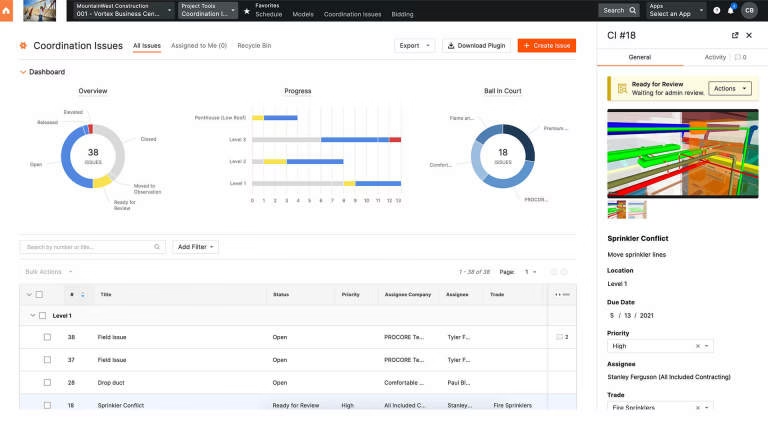Procore is a leading construction management software designed to streamline project workflows and enhance collaboration across teams. With its comprehensive suite of tools, Procore aims to address various challenges in construction management by integrating project management, document control, budgeting, and safety management into one platform. This robust solution helps construction professionals manage projects more efficiently, ensuring timely completion, adherence to budgets, and high-quality outcomes.

Key Features of Procore
Procore stands out as a comprehensive construction project management software, designed to streamline various aspects of construction management. Here’s a closer look at its key features:
- Project Management Tools
Procore offers robust project management tools that help you oversee every phase of your project. From scheduling to task management, the software allows you to assign responsibilities, track progress, and ensure that deadlines are met. The real-time collaboration features make it easier for teams to stay aligned, reducing the risk of miscommunication and delays. - Document Management
Efficient document management is crucial in construction projects, and Procore excels in this area. The platform centralizes all your project documents, including drawings, contracts, and RFIs, in one easily accessible location. You can quickly upload, share, and retrieve documents, ensuring that everyone has access to the latest information. This feature reduces the chances of errors due to outdated or missing documents. - Budgeting and Cost Control
Procore’s budgeting and cost control tools are designed to keep your project’s financials on track. You can easily create and manage budgets, track expenses, and forecast costs. The software provides real-time financial insights, helping you make informed decisions to avoid budget overruns. Integrated with other project management features, it ensures that financial management is seamlessly tied to the overall project workflow. - Quality and Safety Management
Quality and safety are paramount in construction, and Procore offers dedicated tools to manage both. The platform allows you to create and implement quality control checklists, conduct inspections, and document safety incidents. With Procore, you can ensure that all safety protocols are followed and that quality standards are consistently met, reducing the risk of costly rework and enhancing overall project outcomes.
By leveraging these key features, Procore empowers construction teams to manage projects more effectively, ensuring that they are completed on time, within budget, and to the highest standards of quality and safety.
Benefits of Using Procore in Construction Management
- Enhanced Collaboration and Communication: Procore excels at fostering collaboration and communication among construction teams. With all project data centralized on a single platform, team members can easily share updates, documents, and tasks, ensuring that everyone stays on the same page. The platform’s built-in messaging and real-time notifications reduce delays and misunderstandings, enabling seamless coordination between on-site teams, office staff, and external stakeholders. This improved communication helps prevent costly errors and keeps projects moving forward smoothly.
- Real-time Data Access and Reporting: One of Procore’s standout features is its ability to provide real-time data access and reporting. Whether you need to check the latest budget status, monitor project timelines, or assess quality and safety metrics, Procore delivers up-to-date information instantly. This real-time access allows project managers to make informed decisions quickly, helping to avoid potential issues before they escalate. Additionally, Procore’s customizable reporting tools make it easy to generate comprehensive reports for stakeholders, ensuring transparency and accountability throughout the project lifecycle.
- Improved Project Efficiency: By integrating various aspects of construction management into one cohesive platform, Procore significantly enhances project efficiency. Tasks that once required multiple tools and manual processes can now be streamlined within Procore’s ecosystem. For example, budgeting, scheduling, and document management are all interconnected, reducing the time spent on administrative work and allowing teams to focus on delivering quality results. This streamlined approach not only accelerates project timelines but also helps in minimizing costs, ultimately leading to more successful project outcomes.
Procore’s robust features in collaboration, data management, and efficiency make it an invaluable tool for construction professionals looking to optimize their project management processes.
Procore’s User Experience
- Interface and Usability: Procore is designed with user experience in mind, offering an intuitive and user-friendly interface that simplifies complex construction project management tasks. Its dashboard is clean and well-organized, allowing users to navigate effortlessly between different modules such as project management, document control, and financials. The platform minimizes the learning curve, making it accessible to users at all levels of technical proficiency. With drag-and-drop functionality, customizable views, and easy access to real-time data, Procore ensures that users can manage projects efficiently without getting bogged down by complicated processes.
- Mobile Accessibility: In today’s fast-paced construction environment, the ability to manage projects on the go is crucial. Procore’s mobile app provides seamless access to all of the platform’s features from smartphones and tablets, enabling teams to stay connected and informed, no matter where they are. Whether it’s uploading site photos, updating project schedules, or reviewing plans, the mobile app’s interface is optimized for touchscreens, ensuring that tasks can be completed quickly and easily. Procore’s mobile accessibility not only enhances productivity but also ensures that critical information is always at your fingertips, facilitating real-time decision-making and collaboration.
By focusing on a seamless user experience both on desktop and mobile, Procore ensures that construction professionals can manage their projects with confidence, whether they’re in the office or on-site.
Procore Integrations with Other Construction Tools
- Integration Capabilities with Popular Software: Procore stands out in the construction management software space due to its extensive integration capabilities. It seamlessly connects with a wide range of popular software tools that many construction professionals already use, such as Microsoft Project, Sage 300, QuickBooks, and AutoCAD. These integrations ensure that your team can continue using the specialized tools they’re familiar with while benefiting from Procore’s centralized project management platform. By syncing data across these tools, Procore reduces duplication of effort and ensures that all project information remains consistent and up-to-date.
- Customization Options: Procore also offers robust customization options that allow users to tailor the platform to their specific needs. Whether you’re looking to create custom workflows, set up unique permissions, or develop tailored dashboards, Procore’s flexibility makes it easy to adapt the software to fit your project requirements. Additionally, Procore’s open API enables more advanced users to build custom integrations with niche or proprietary software tools, further enhancing the platform’s utility. This level of customization ensures that Procore can serve as a comprehensive hub for all your construction management needs, regardless of the complexity or scale of your projects.
By offering seamless integrations and extensive customization options, Procore not only streamlines workflows but also enhances the overall efficiency and effectiveness of your construction management processes.
Procore vs. Other Construction Management Software
- Comparisons with Competitors: When evaluating construction management software, Procore often comes out on top due to its comprehensive features and user-friendly interface. While other platforms like Buildertrend, PlanGrid, and CoConstruct offer robust tools for specific aspects of construction management, Procore excels in providing an all-in-one solution that covers the entire project lifecycle. For instance, Buildertrend is strong in pre-construction and client management, and PlanGrid shines in blueprint and document management, but Procore brings together these functionalities into a single, integrated platform. This consolidation reduces the need for multiple software subscriptions and streamlines communication across teams.
- Unique Selling Points of Procore: One of Procore’s standout features is its extensive integration capabilities. Unlike some competitors that limit you to their ecosystem, Procore connects seamlessly with a wide range of other construction tools, including QuickBooks, Sage, and Microsoft Project. This flexibility ensures that teams can continue using the specialized software they prefer while centralizing all project data within Procore.
- Another unique advantage is Procore’s focus on collaboration and communication. Its mobile-friendly platform allows teams to access real-time data, documents, and project updates from any location, ensuring that everyone remains on the same page regardless of where they are working. This real-time access, combined with powerful reporting and analytics tools, gives Procore users a competitive edge in managing complex construction projects efficiently.
Ultimately, Procore’s comprehensive features, superior integration options, and focus on enhancing collaboration make it a leading choice for construction management, setting it apart from other software options on the market.
Pricing and Licensing Options for Procore
- Subscription Models: Procore offers a subscription-based pricing model that caters to the diverse needs of construction firms, ranging from small businesses to large enterprises. Unlike some competitors with rigid pricing structures, Procore’s subscription model is based on the size of your company and the scope of your projects. This means you pay for what you use, making it a scalable solution whether you’re managing a handful of small projects or overseeing multiple large-scale developments. This flexibility ensures that Procore can grow with your business, adapting to your needs without unnecessary costs.
- Customizable Pricing Plans: Procore also provides customizable pricing plans tailored to your specific requirements. Instead of a one-size-fits-all approach, Procore works with you to determine which features and tools are most relevant to your projects. This customization can significantly reduce costs by eliminating unnecessary features that your team might not need. Additionally, Procore offers tiered pricing based on the modules you choose, such as Project Management, Quality & Safety, or Financial Management. This allows you to start with a basic package and add more functionality as your project demands increase.
Moreover, Procore’s customer success team is known for providing detailed cost breakdowns and ROI analysis, helping you understand the value you’ll get from the platform. This level of transparency and flexibility in pricing ensures that your investment in Procore aligns perfectly with your budget and project goals, making it a cost-effective solution for managing construction projects of any size.
Common Challenges with Procore and How to Overcome Them
- Learning Curve for New Users
- Challenge: Procore’s robust feature set can be overwhelming for new users, leading to a steep learning curve. The sheer volume of tools and modules can make it difficult for teams to fully grasp how to utilize the platform effectively.
- Solution: Implement a structured onboarding process that includes comprehensive training sessions. Procore offers a wealth of resources, including webinars, tutorials, and customer support. Encourage your team to take advantage of these tools, and consider appointing a Procore champion within your team who can help guide others through the learning process. Regular practice and gradual exposure to more complex features can ease the transition.
- Integration Issues with Other Software
- Challenge: While Procore offers extensive integration capabilities, sometimes there are compatibility issues with other software your company might be using. These issues can cause disruptions in workflow and data inconsistencies.
- Solution: To overcome this challenge, thoroughly evaluate your existing software stack before implementing Procore. Procore’s integration team can assist in setting up and customizing the necessary integrations. Testing the integrations in a sandbox environment before full deployment can also help identify and resolve issues early on. Additionally, keeping your software updated can reduce compatibility issues.
- High Customization Needs
- Challenge: Every construction project is unique, and some teams find that Procore’s default settings don’t meet their specific needs. This can lead to frustrations when trying to customize the platform to fit their workflow.
- Solution: Procore allows for significant customization, but it may require some initial effort to set up correctly. Work closely with Procore’s customer support to tailor the platform to your requirements. Utilize Procore’s API for deeper customization, or consider hiring an experienced Procore consultant who can help configure the system to match your specific needs. Regularly review and adjust settings as your projects evolve to ensure ongoing alignment with your workflow.
- Cost Concerns
- Challenge: Procore’s pricing can be a concern for smaller companies or those with tighter budgets. The cost of the platform might seem high compared to other tools, especially if not all features are being used.
- Solution: Carefully assess which Procore modules are essential for your business. Start with the basic package and gradually add features as your team becomes more comfortable with the platform. Regularly review your usage to ensure you’re not paying for unnecessary features. Additionally, leverage Procore’s ROI analysis tools to demonstrate the platform’s value to stakeholders and justify the investment.
By addressing these common challenges proactively, your team can fully harness the power of Procore, improving project outcomes and maximizing the return on your investment in construction management software.
FAQs about Procore in Construction Management
- What is Procore and what does it do?
Procore is a cloud-based construction management platform that provides tools for project management, document management, budgeting, cost control, quality and safety management, and more. It is designed to facilitate better communication and collaboration among project teams, streamline workflows, and improve overall project efficiency. - How does Procore improve project management?
Procore enhances project management by offering a centralized platform for tracking project progress, managing documents, and overseeing budgets. Its real-time data access allows project managers to make informed decisions quickly. The platform also supports seamless communication and collaboration, which helps to reduce delays and errors. - What are the key features of Procore?
Key features of Procore include project management tools, document management, budgeting and cost control, quality and safety management, and real-time data reporting. It also offers mobile accessibility, integration with other construction tools, and customizable settings to fit specific project needs. - How does Procore handle document management?
Procore provides a centralized document management system where users can upload, share, and track documents. It includes features for version control, file sharing, and access permissions, which helps ensure that all team members are working with the most current and accurate information. - What are the pricing options for Procore?
Procore offers subscription-based pricing with customizable plans based on the features and scale required for each project. Pricing typically depends on factors such as project size, number of users, and the specific modules selected. Prospective users can contact Procore for a tailored quote and to discuss pricing options. - Can Procore integrate with other software?
Yes, Procore supports integration with a variety of other construction management tools and software. This includes integrations with accounting systems, scheduling tools, and other project management applications. Procore’s API and integration capabilities help ensure that data flows smoothly between systems. - What are common challenges with using Procore?
Common challenges include a steep learning curve for new users, integration issues with other software, and customization needs. However, these challenges can be mitigated through training, thorough planning, and leveraging Procore’s support resources.
Conclusion
Procore has made a significant impact on construction management by providing a unified platform that integrates essential tools and functionalities. It enhances collaboration and communication among project teams, offers real-time data access for better decision-making, and improves overall project efficiency. Despite some challenges, such as a learning curve and integration issues, Procore’s comprehensive features and customizable options make it a valuable asset for managing construction projects effectively. By addressing these challenges and leveraging Procore’s capabilities, construction professionals can achieve better project outcomes, streamline their workflows, and ensure successful project completion.
Disclaimer: The information provided in this article is based on personal experience and industry knowledge. It is intended for informational purposes only and does not constitute professional advice.








Leave a Reply